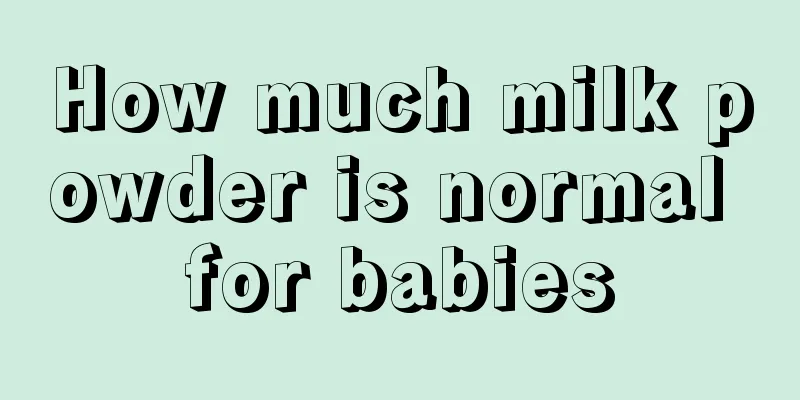How much milk powder is normal for babies

|
Many friends who are first-time mothers will want to know whether their babies' diet is normal while their babies are eating milk powder. This requires knowing how much milk powder the baby should eat among their peers. This is sometimes also a criterion for measuring whether the baby is healthy or not. In this situation, many mothers will be particularly concerned. So, how much milk powder is normal for a baby to drink? Let’s learn more about it through the following introduction. The stomach capacity of a newborn baby is very small (30~35ml for a newborn, about 100ml for 3 months, 200ml for 6 months, and 300~500ml for 1 year old), and the amount of gastric juice secretion is small. The gastric emptying time varies with the type and nature of food. For breastfeeding, the gastric emptying time is 2 to 3 hours, for milk feeding it is 3 to 4 hours, and for water it is 1 to 2 hours. In the first few days after the baby is born, the amount of milk can be calculated based on the baby's weight per kilogram, and 100 to 200 ml should be given per day. Because milk is not easy to digest, it needs to be diluted with water. The ratio can be 4:1, 3:1, 3:2, 2:1, or 1:1. If two parts of milk are mixed with one part of water, it will be 300 (360) ml of milk + 150 (160) ml of water, with a total of 450~480 ml. Divide it into 7~8 doses, with each dose being 60~70 ml. Add 5% sugar to the milk, and increase this proportion at five and six months. From 15 days to one month old, if the digestion is normal, the baby can eat pure milk, nearly 100-150 ml per kilogram of body weight, and about 60-100 ml per meal. From one month to two months after the baby is born: the amount of milk should be gradually increased according to the baby's weight. The baby should be fed 6 to 7 times a day, with an interval of 3.5 to 4 hours between each feeding. Each feeding should be about 80 to 120 ml. You can take up to 150 ml. Two to three months: Feed 5 to 6 times a day, once every four hours, with 150 to 200 ml of milk each time. Three to six months: feed 5 times a day, once every four hours, and the amount of milk per feeding is: 150-200 ml for three to five months, 200-250 ml for five to six months. The total amount of milk intake should be controlled, not exceeding 1000 ml per day, and the amount of milk per feeding should not exceed 250 ml. Start feeding complementary foods before breastfeeding at four months. Six to nine months: Feed every four hours, 200-250 ml each time. Change from four meals of milk to three meals a day, and gradually introduce complementary foods starting from replacing half a meal to one meal of milk. The amount of sugar in the diet gradually decreases. Nine to twelve months: Reduce milk from three times a day to two times a day, 250 ml each time, still eat once every four hours, and eat complementary food for the other meals. Feed water between every two feedings. Through the above introduction, we know how much milk powder is normal for babies to drink. In fact, this is just a general standard. The specific situation of each baby is different. As long as the baby's physical and developmental aspects are normal, it's fine. However, when the baby drinks milk powder, you must let the baby drink more water. Babies who drink milk powder are prone to getting angry. |
<<: What is the reason for baby tear duct flushing?
>>: What are the symptoms of babies getting angry after drinking milk?
Recommend
4 things to keep in mind when taking sugar pills
The first issue that expectant mothers have to fa...
What causes dry mouth in newborns?
Many mothers have encountered this situation when...
One-year-old baby walks with his feet a little crooked
When babies first start learning to walk, they ma...
What does a one month old baby's stool look like?
Right after the baby is born, because the baby ca...
What should I do if my baby has dry and hard stools and difficulty defecating?
The baby's stool is always very dry and hard,...
What to do if your 6-year-old baby has a stomachache
When a child is feeling unwell it causes great di...
Can children who are not calcium deficient take calcium supplements?
Many mothers often give their babies calcium, bec...
What to do if your child has a cold or cough in summer
In the summer, the temperature indoors is relativ...
What to do if your child doesn't like brushing his teeth
The process of children developing many habits ca...
Symptoms of hydrocele in children
Pediatric development issues have become an incre...
What should I do if my three-year-old child is easily angry?
Children nowadays are the treasures of the family...
What is the reason for the red spots on the baby's palms?
Once a child has some health problems, parents ar...
What are the complete recipes for children’s spleen and stomach strengthening soups?
Compared with adults, children's spleen and s...
What to do if your child has heavy teeth
Children will start to change their teeth when th...
Newborn baby convulsions
Children's bodies are relatively fragile, so ...









